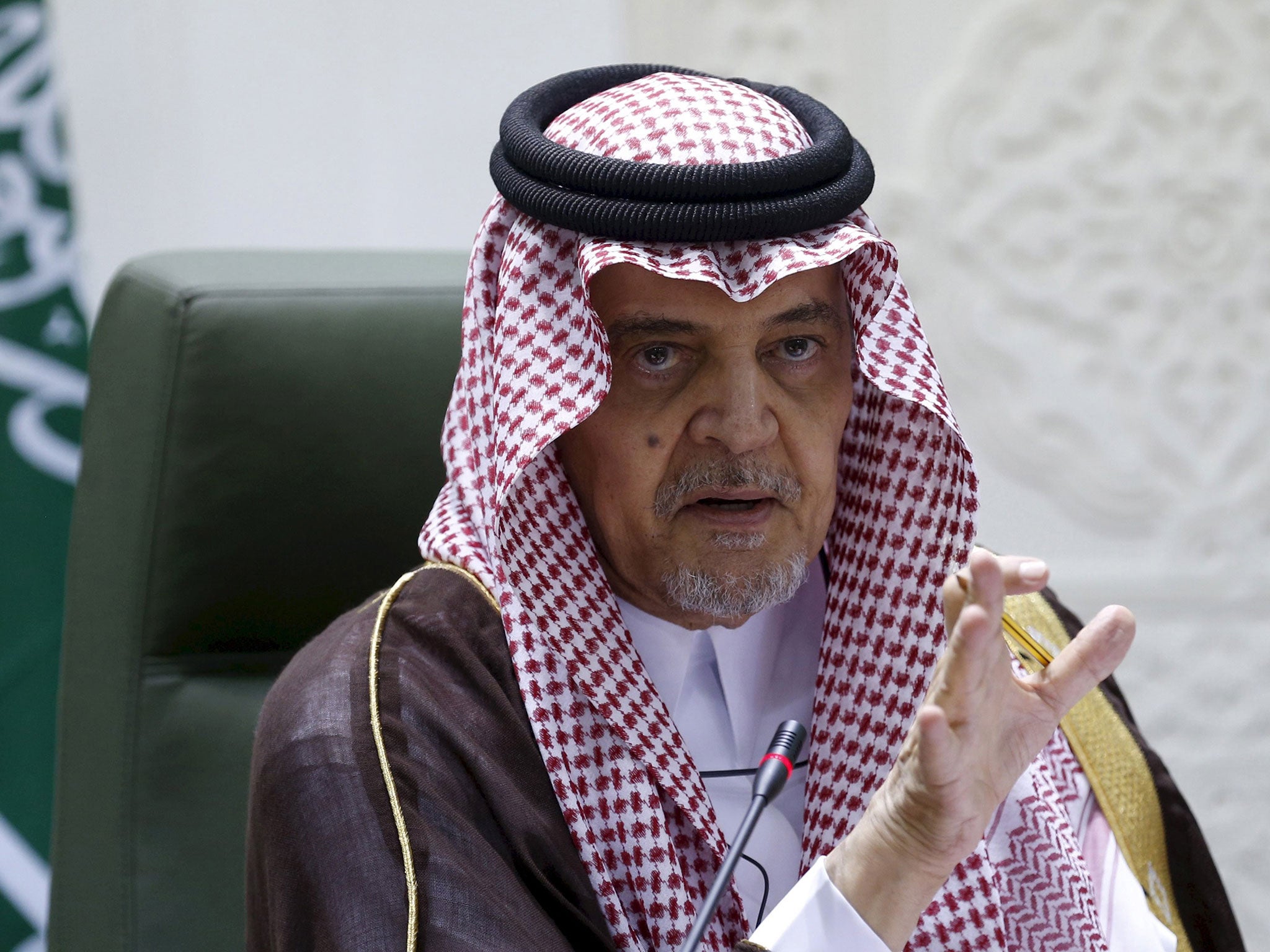Prince Saud al-Faisal: Politician who spent 40 years guiding Saudi Arabia through crises and tensions throughout the Middle East
The prince, fluent in English and French, brought an air of sophistication and charisma, whether in crisp suits or in traditional Saudi robes

Saudi Arabia’s Prince Saud al-Faisal was the world’s longest-serving foreign minister, with 40 years in the post until his retirement because of ill-health earlier this year. The tall, stately prince was a fixture of Middle Eastern diplomacy, representing the oil-rich Gulf power as it wielded its influence in crisis after crisis shaking the region.
Those crises ranged from Lebanon’s civil war in the 1970s and 1980s, multiple rounds of Arab-Israeli peace efforts, the 1990 Iraqi invasion of neighbouring Kuwait and the subsequent Gulf War, the 9/11 attacks by al-Qaida in the US and the 2003 invasion of Iraq, as well as the current tensions between the Arab Gulf bloc and Iran, the Arab Spring uprisings, Syria’s civil war and the spread of Islamic State.
When he prince stepped down on 29 April, the US Secretary of State John Kerry said he “has not just been the planet’s longest-serving Foreign Minister but also among the wisest.” He said the prince was “a man of vast experience, personal warmth, great dignity, and keen insights who served his country loyally and well. I personally admired him greatly, valued his friendship, and appreciated his wise counsel. His legacy as a statesman and diplomat will not be forgotten.” He was succeeded by Adel al-Jubeir, formerly Ambassador to Washington.
Saud was the son of Saudi Arabia’s third king, Faisal, who ruled from 1964 until he was assassinated in 1975. Saud, who graduated in economics from Princeton and had been deputy oil minister, was appointed foreign minister soon after, a post his father had held during his reign.
The young prince, fluent in English and French, brought an air of sophistication and charisma, whether in crisp suits or in traditional Saudi robes. Softly spoken, he showed a sense of humour not often seen among the publicly stolid royal family.
He was father to six children, three boys and three girls. King Salman’s son, Prince Sultan, is married to one of Prince Saud’s daughters. The late prince’s brothers are also known as highly educated and eloquent, with Prince Khaled al-Faisal serving as the governor of Mecca and another brother, Prince Turki al-Faisal, heading a research centre and think tank after decades as the head of intelligence.
Mamoun Fandy, author of Saudi Arabia and the Politics of Dissent, said the Prince’s death marks the end of an era as the elder royals move to shift power to younger princes. “The history of Saudi foreign policy is al-Faisal, both him and his father,” he said. “It’s how the world knew Saudi Arabia, through al-Faisal.”
The Arab League Secretary General Nabil al-Arabi said the world has lost a “noble” diplomat who defended his nation with “courage and valour.” At home he championed social reform, observing for instance, “Nowhere in the Koran is it written that women are not allowed to drive cars,” adding, “They are more sensible voters than men”.
He led Saudi diplomacy over a period that saw the kingdom, once better known for its behind-the-scenes influence, become more overt in affairs across the Middle East. Tending to the alliance with the US was a major part of that, and Saddam’s invasion of Kuwait brought US troops to Saudi Arabia, a deployment that raised some domestic opposition among Saudis.
Al-Faisal played a key role in patching ties with the US which were strained by the 9/11 attacks, in which 15 of the 19 hijackers were Saudi nationals. He insisted in public speeches that Islam and Muslims are not the enemy, declaring in 2004 in an address at the European Policy Centre in Brussels: “You just cannot dismiss a 1,400-year-old culture and civilisation by stigmatising it as merely a hatchery for terrorism.”
After the 2003 US-led invasion of Iraq removed Saddam, Saudi Arabia often bristled over the consequences – the rise of Shiite power in Baghdad and the growing influence there of Shiite-led Iran, the kingdom’s principal rival. Saud “had to explain to the world how they hated Saddam Hussein, but objected handing over Iraq to Iran,” said Fandy.
Al-Faisal was not seen as a hawk toward Iran, but was part of the leadership that saw the Shiite power across the Gulf waters as the main challenge to Sunni-led Saudi Arabia. Last year, he invited the Iranian Foreign Minister Mohammad Javad Zarif to visit Saudi Arabia, but later accused Iran of fomenting unrest throughout the Middle East. Zarif ended up visiting shortly after King Abdullah’s death in late January and expressed hopes of greater co-operation.
In March Saud helped rally efforts for Saudi Arabia to lead an Arab coalition to bomb Yemen’s Shiite rebels who had taken over the capital there. “We are not warmongers, but if the drums of war call for it, we are prepared,” he said, arguing that Yemen was integral to Gulf security and that Iran was behind the rebels.
The Prince had suffered much ill-health in recent years, including Parkinson’s Disease, and had had several spinal operations in the US. He once approached King Abdullah to ask to retire as foreign minister, saying he was tired and needed to rest. The monarch refused, telling him, “So I should be the only one to die in office?”
Prince Saud bin Faisal bin Abdulaziz Al Saud, politician: born Ta’if, Saudi Arabia 2 January 1940; married Jawhara bint Abdullah bin Abdul-Rahman (three daughters, three sons); died 9 July 2015
Join our commenting forum
Join thought-provoking conversations, follow other Independent readers and see their replies
Comments
Bookmark popover
Removed from bookmarks